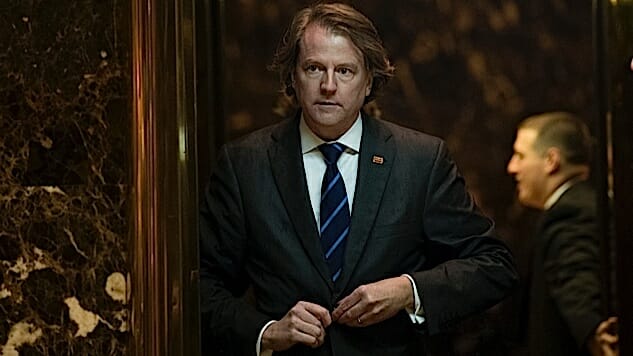Last Night, We Learned That Even the White House Counsel Knows Trump Committed a Crime
Photo by Drew Angerer/Getty
Thursday night, the Failing New York Times published a report that said, among other things, that White House counsel Don McGahn threatened to resign when Donald Trump, the President of the United States of America, said he wanted to fire not former FBI director James Comey this time, but Special Counsel Robert Mueller, who Trump had recently learned was investigating him personally for obstruction of justice. For when he’d fired James Comey.
If you dismiss the Times story because it cites anonymous sources, as Sean Hannity initially did, you might reconsider upon “learning that Fox News independently confirmed” these details, prompting Hannity to admit that, yeah, maybe he was wrong. He then literally cut to a car chase that ended in a fiery crash.
Not only is this whole story a real rib-tickler, it also indicates that McGahn, the White House counsel, knows, and knew, that Trump’s suggestion to fire Mueller proved he had the criminal intent to obstruct justice. This is important because obstruction charges hinge on proving the suspect’s criminal intent. These new details also indicate McGahn knows he’s likely guilty of the same.
Here’s why.
Where to begin…
It’s difficult. The evidence evincing the White House’s conspiracy to obstruct justice is overwhelming. We could begin with Trump asking Comey for personal loyalty. Or the saga of Michael Flynn’s FBI investigation, and his lies about speaking with Sergey Kislyak. Or the Trump transition team’s knowledge, or orders, of the same. Or the transition team’s direct knowledge, given to them via Flynn himself three weeks before Trump’s inauguration, that Flynn had been since late November the subject of another DOJ investigation into his work as a foreign agent for Turkey. The Flynn thing could go on: McGahn’s knowledge in late January that Flynn likely lied to the FBI; his telling Trump and other White House staff the same; Trump’s strange two-week delay before firing Flynn, which Trump followed up by asking Comey to “let this Flynn thing go”; or Trump’s desire to bring Flynn back into the White House a few months after firing him, even knowing at the time that Flynn had lied to the FBI and been under investigation for acting as a foreign agent of Turkey, and had registered at least half a year late as a foreign agent of Turkey.
Or maybe we could go with Jeff Sessions’s recusal from the Russia investigation, only to recommend that the head of that investigation be fired months later. We could go with Jared Kushner, who was with Trump the weekend he drafted his letter to fire Comey because of Russia; or with Kushner’s wife and Trump’s daughter, Ivanka, who was also there; or with Stephen Miller, who helped draft that memo; or with Steve Bannon, who looks like a carved block of whale fat that a hyperactive 12-year-old shot up with a BB gun and who was with the White House team when they were deciding how best to fire Comey, and who actually advised against it, telling them he believed it was a criminal act. Or we could go with Mike Pence, who is deeply implicated in the Flynn investigations and also advocated the Comey firing that weekend in May. Or we could go with Trump himself for about a trillion reasons, including asking the heads of not one, not two, not three, but four intelligence agencies to stop the Russia investigation.
And this doesn’t even get us to the Trump Tower meeting and cover-up.
You can’t understate the amount of evidence, and you can’t understate how stupid these people are.
But let’s approach this from the new news.
Trump wanted to fire Special Counsel Robert Mueller
Again, to convict someone of obstruction of justice you must show they had the intent to obstruct justice. Note that this doesn’t mean you have to demonstrate they knew they were breaking any specific law. If you’re unaware of the speed limit, you still get the ticket.
Also, if you’ve resorted to this as your talking point, please stop defending the President.
The new details indicate Trump had criminal intent when he ordered Robert Mueller fired a month into the special counsel’s investigation. But on top of this, knowing only what we know about Trump and McGahn’s interactions from May – June, and not what Mueller himself now knows through a multitude of interviews with the involved suspects, it seems much more complicated.
In short, as mentioned above, it all also implies that McGahn himself knows, and knew at the time, that Trump is guilty of intent to obstruct. It also indicates Trump knew he would be breaking the law, i.e., he knew it would imply criminal intent.
I’m nowhere near being a lawyer, by the way. Take this all as you will. It’s logic, not the law, and the two sometimes diverge.
First, it’s important to remember that Trump at first didn’t fabricate his reasons for firing James Comey. He reportedly put it plain as day in his initial draft of his memo to fire the FBI Birector. But as former federal prosecutor Renato Mariotti pointed out, the President has the right to fire the FBI Director if the President he believes the FBI Director wasn’t doing a good job. Trump could very well argue that he believed Comey was wasting valuable FBI time and resources for pursuing the Russia investigation, and, ironically, Trump’s own incriminating evidence could show this, as could his multiple confessions to the same, including on national TV and to senior Russian government officials in the Oval Office.
Here you could point out Trump said he fired Comey for other reasons, but that doesn’t matter. You can fire someone for doing many things wrong. The problem here is still proving Trump’s criminal intent.
This is because Trump might be able to claim he was just acting on the White House counsel’s advice when he fired Comey. As has been reported, McGahn gave Jeff Sessions and Deputy Attorney General Rod Rosenstein markups of a second draft when Trump asked them, in the Oval Office, to write up recommendations to fire Comey. This shows that McGahn determined they needed to come up with other reasons in order to get around Trump’s real intent for firing Comey. This indicates that McGahn knew that such reasons might be illegal. Note that this also means Trump himself had been warned that his real intent might indeed run afoul of the law.
Now Trump, upon having fired Comey, actually interviewed Mueller as a candidate to run the FBI. Mueller didn’t get the job, but was named Special Counsel in charge of the investigation into Russia’s attack on our election, and any coordination with members the Trump campaign. This included an obstruction of justice investigation involving Trump himself, which, thanks to Trump’s firing of Comey, the Special Counsel opened immediately. After Trump learned he was a target of this obstruction investigation—which was first reported in early June—he said he wanted to fire Mueller.
We can say for certain then, that Trump at this point would have known that firing Mueller, with the intent of interfering in the Special Counsel’s investigation into himself, would likely be illegal.
Here’s the rub: Trump proceeded to make up reasons to fire Mueller unrelated to the Russia investigation. He said Mueller had three conflicts of interest: One, Mueller had canceled his membership at a Trump golf club because of some hubbub about fees (?!); two, Mueller’s law firm had represented Kushner (which if anything would suggest a pro-Trump bias); and third, and weirdest, Trump had interviewed Mueller to lead the FBI.
But why would Trump dig so deep for all this bullshit? Because he’d learned how to get around the law from McGahn himself! Trump knew what he was doing was illegal, but, weirdly enough, Trump might still claim he was simply acting on the legal advice of government counsel.
This doesn’t change the fact that a) Trump was clearly aware of obstruction laws; b) Trump felt his true intent, if known, would break those laws; c) he wished to deceive the law; and d) it doesn’t even matter what he knew about the law.
Note that Mueller also has interviewed Jeff Sessions and Rod Rosenstein, who almost certainly were informed of Trump’s intent to fire Mueller.
In response to Trump’s idea, though, McGahn threatened to resign. This means the White House counsel himself didn’t want to be connected to what he’d determined a clearly intentional criminal attempt on behalf of the President of the United States to obstruct justice. In other words, even McGahn thinks Trump is guilty. But McGahn, who cooked up the excuses for firing Comey, would also have known he himself would be found guilty.
So what?
The last resort of Trump apologists such as Alan Dershowitz—and the objectively terrible MAGA people—is to say, well, it doesn’t matter. The President can do what he wants.
No, he can’t. He can’t, for instance, break the law. If your argument now is that the President can’t be indicted, first, go look in the mirror and if you don’t change your mind please leave the country you un-American jackal, but second, yes, the President can indeed be indicted.
Will Trump be removed from office? Unclear. Even if Democrats flip the House of Representatives later this year and impeach the President, the Senate must confirm that judgment by a 60-vote majority. The Democrats, clearly, will not have 60 votes. Will Republicans with a conscience flip? Unlikely, but, given the evidence, who knows.
This means that even if Trump is indicted, the GOP’s virulent case of a-holeism means he might not be impeached. In this world, it’s possible the President of the United States runs the country under White House arrest. Along with his White House counsel.







































